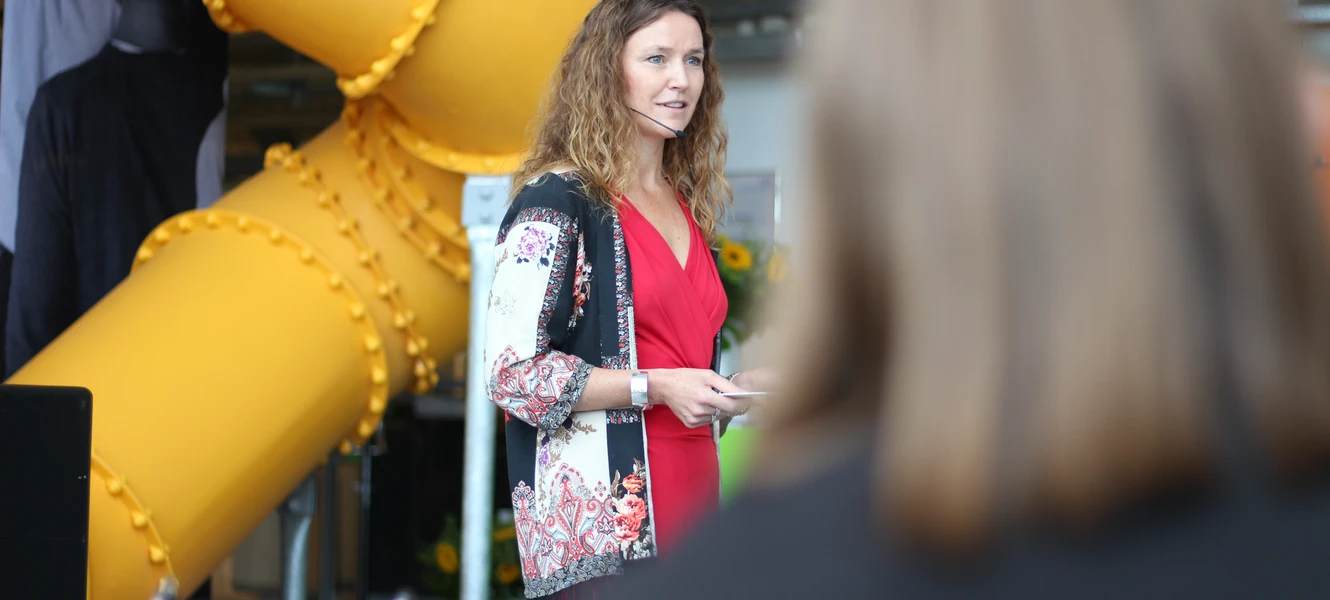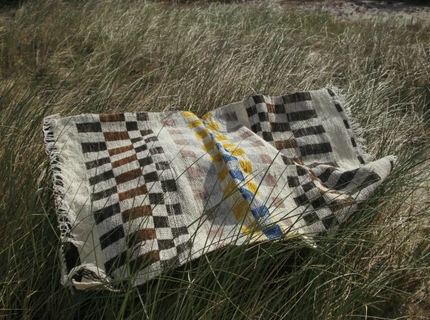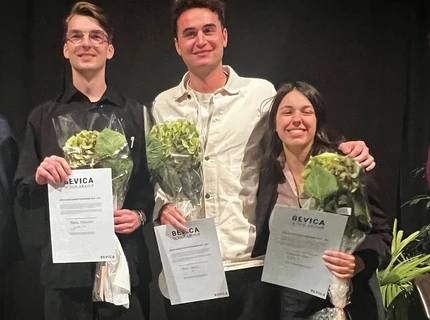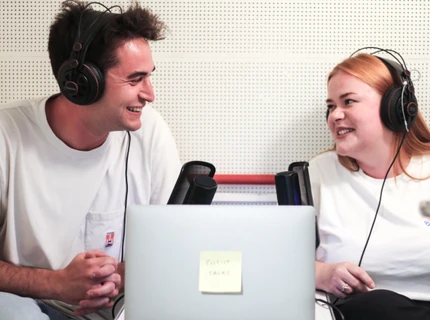
You can do something!
- There’s a risk that your system becomes overloaded by the effects of a world that is becoming increasingly uncertain and mad.
On Monday 31 August, in her first welcoming speech as the rector of Design School Kolding, Lene Tanggaard greeted the new students - in a time that seems to be filled with worries.
- The world is going mad, most likely even more so over time – but right here, in front of me, there’s actually something that I can grab on to and perhaps change for the better, she said.
Read - or listen to - what Lene believes you can do:
”We’re not afraid to work with small problems, and we believe in small changes”.
This was one of the first statements I encountered as the new rector at Design School Kolding in November 2019. It came from Vibeke Riisberg, our senior and very experienced designer and researcher. The sentence came up as we were walking the streets of New York on our way to a symposium on SDG12 and sustainability in design arranged by the Danish Consulate.
For many reasons, what Vibeke said keeps coming back to me. The most important reason is that it reminds me of values I have to uphold as the school’s new rector – but more than that, it sheds light on something I sincerely believe to be true: That small changes can be powerful indeed and one of the best ways to empower people to be creative.
So welcome to our school – a place where everyday problem-solving and the simple wonders of learning and training, ’Bildung’, and hard work come together. And sometimes end up changing the world.
You have arrived at a school where, hopefully, as part of your design training, you will have every change to immerse yourselves in your interests and passions, and you will live and learn closely (yet, in these times, not too closely) with fellow students who share some of the same interests as you. What a privilege.
Hopefully you will also meet people who are very different from you and make friends for life. No doubt, frustration and confusion will accompany you on your educational journey. You will meet dedicated teachers and researchers who will ask you to move in directions you never thought you would dare go. They will tell you strange things. They will not always agree with each other. Systems will not always work, and mistakes will be made. But they are the most dedicated staff I can think of, and they will do everything in their power to give you the best training possible.
Education is a mode of inquiry. It will not always provide you with the final answers, but it will enable and inspire you to be reflective and responsible and to act with consideration and care. It’s a set-up that works when your teachers trust that you are working and trying to learn, and when you have faith in your teachers.
This makes you lucky devils. Did I just say that? You know, in Danish we don’t actually use the expression ‘lucky devil’. Instead we say: ‘you’re a lucky potato’. As you might know, Danish philosopher and theologian Søren Kierkegaard distinguished between ideas and potatoes, between the soul and the body. So you’re potatoes! But fortunately, you’re more than that.
Søren Kierkegaard was born in 1813 and died in 1855. During that period, the beginning of the 19th century, the human body and the sensuous part of our being were primarily seen as a source of error. However already in 1735, 21-year-old German philosopher Alexander Baumgarten proposed an entirely new science called aesthetics. The science should not be about what we know (ponta), but about what we sense. And it is based on this science that we came to build art schools and universities – like this one. Aesthetics, or art thinking, deals with our ’unknown knowns’. The knowledge we can access through our senses, our cognito sensitiva. This is a knowledge that cannot necessarily be translated into sophisticated sentences. In fact, it’s often quite chaotic and potato-like.
Art is a way of creating the world. In a design school we’re able to actively process some of this obscure knowledge. Using design we’re able to ideally move towards more freedom for people, organisms and the Planet (and let’s by all means include all the other planets as well). Sensuously, chaotically and potato-like. This is why we’re allowed to be somewhat of a hullabaloo place. In fact, that’s our job. Isn’t that great? Still, allow me to dwell a little bit on what I said in the beginning about the small things. Because I believe it’s more important than ever to remember that small things (also what we design) can make a big difference.
Small means considering the human aspect
First of all, as human beings we have a limited capacity for worrying. We have a limited cognitive reach as well, for that matter. Some more than others, for sure, but let me give you an example. In order to be able to memorize a random sequence of numbers, for instance 3974697135897456, most of us have to divide this sequence into four or five smaller sections, for instance 3974 and 6971 and 3589 and 7456. We’re able to manage the sequence of numbers by dividing it into smaller units that are easier to remember.
Today we leave most such matters to software programmes, and for instance, I’m able to recall the phone number of the parents of my childhood friend, but not those of my kids – even though I use them all the time. My phone takes care of that for me. Now I just press a name, whereas in the past I used to keep several phone numbers stored in my own memory. We have handed over cognitive capacity to computer software, which allows us to use our limited cognitive resources on other stuff than just meaningless phone numbers. Whether this has gradually made us less intelligent is a good question, but why this need to break down a sequence of numbers? This need to focus on smaller units instead of the longer, rather meaningless sequence. Apart from the fact that we struggle to remember it, I think the answer to this question can also be found in the notion that small units limit our emotional exhaustion.
Allow me to quote Ola Rosling from an interview in Danish newspaper Politiken on the 8th of August 2020: ”The problem is that the human soul has a limited capacity for worrying. And when the whole world is described as going mad, we’re constantly drawing on our resources for worrying.” In the interview he refers to the book Factfulness from 2017, which sums up how Ola Rosling’s dad, Hans Rosling, spent his life correcting misconceptions about statistics.
Inspiring hope
So how can we go about this? We can inspire hope, Rosling says, by learning about proportions. For instance by understanding that today, we’re far better at handling pandemics than we were a hundred years ago. We can learn to understand the extent of a problem by breaking it down into smaller units, like I just did with the sequence of numbers. Your compassion and capacity for action will diminish when you’ve almost given up in advance, exhausted by the thought of insurmountable obstacles. Therefore, we must dare to be specific, and it must be legitimate to work on small problems. In school and anywhere else. The world is going mad, most likely even more so over time – but right here, in front of me, there’s actually something that I can grab on to and perhaps change for the better. We need to remind one another of this.
So yes, you must change the world, and you will. You will become more qualified and competent than the generations before you. You’re already more responsible, you have a more ethical mindset, and perhaps you’re even smarter. However, there’s also a risk that your system becomes overloaded by the effects of a world that is becoming increasingly uncertain and mad. So remember to enjoy yourselves. Remind yourselves that the people around you don’t have it all figured out either. Know that it’s okay to feel bad one day and on top of the world the next. Remember that you must learn to crawl before you can walk. Remember that you make a difference to others, even if you don’t always feel it. Remember to clean up after yourselves. Remember that it’s together that we create a great school. And if you do your best, that’s often enough. Nobody is perfect. A big movement requires many small steps. Grab on to what’s in front of you; this opportunity to immerse yourselves in the field of design.
Thank you.


